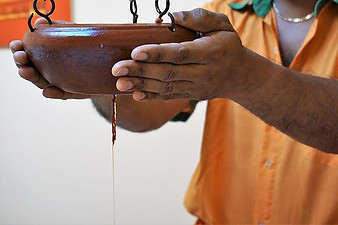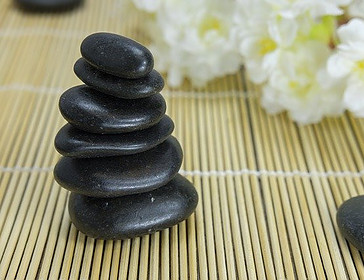
What´s the Art of Ayurveda?
We may have heard the word Ayurveda before, and we didn’t know what it was or what it meant. This word is increasingly popular worldwide within the field of health. And it´s known, that when something becomes as popular within a fundamental pillar as it´s the health one, it´s because surely has a lot to offer, teach and contribute to our lives, especially when being recognized by the world health organization in 2002.
That´s why I invite you to keep reading to find out more about the incredible science of Ayurveda, together with all its benefits within a holistic approach.
What I’d like to give you as a gift: It´s the freedom to choose what might be beneficial to your own life by knowing:

- What is the Science of Ayurveda
- The principles of Ayurveda: The 3 doshas and meaning
- Tips to prevent a dosha from an imbalance
- Ayurvedic Therapies
- Ayurveda Benefits
1. What is the Science of Ayurveda
To begin with, it is important to know that the Sanskrit term “Ayurveda” literally means “The Science of Life“, being the oldest art of healing practiced in India for more than 5 million years by millions of people. And it´s a part that goes hand in hand with the practice of Yoga, which teaches us to live in harmony with our most material dimension, in other words, we are composed of earth, water, air, fire, and ether.
Our body and our mind are intrinsically inseparable. What happens sometimes is that they can become unbalanced when we carry out habits and practices against the laws of Nature.
 What is fantastic about this healing art is that constitutes a knowledge system that helps the healthy person to preserve his/her health, and the sick person to recover from it. Where our state of health and well-being is directly related to our actions, in other words to our habits, whether they are harmonious or not.
What is fantastic about this healing art is that constitutes a knowledge system that helps the healthy person to preserve his/her health, and the sick person to recover from it. Where our state of health and well-being is directly related to our actions, in other words to our habits, whether they are harmonious or not.
And what does this mean? If our habits are harmonious we will have health, and if they are not, the disease will come, and somehow will warn us of this imbalance. The Ayurveda teaches us to maintain healthier lifestyle habits according to our constitution, age, work, social and emotional environment.
Plus also correct if there is an imbalance from the origin, by working on four levels: the physical, the mental, the emotional, and the spiritual. As there isn´t an external treatment that can by itself restore permanent balance, as it does not affect the deep structure of cells, where alterations originate.
For us to understand and integrate better this Science, it´s essential to talk about ¨The Doshas¨.
2. The principles of Ayurveda: The 3 Doshas and meaning
To benefit from the wisdom of Ayurveda it´s important to know what kind of constitution we have because the treatments adapt to the characteristics of each person. And each constitution is determined by the activity of the three doshas or humor called Vata, pitta, and Kapha, each of which is the manifestation of corresponding cosmic energy:
- Vata: is formed by ether and air elements, the beginning of the movement, being the subtle energy that governs biological movement and engenders all subtle changes in metabolism. And governs feelings such as fear, anxiety, and nervousness.
- Pitta: is formed by the elements fire and water. So it is the dosha that governs digestion, absorption, assimilation, nutrition, body temperature, eye luster. And also intelligence and understanding. Psychologically Pitta awakens anger, hatred, and jealousy.
- And Kapha: It translates as biological water and is formed by the water and soil elements. Water is the main constituent of Kapha and is responsible for the biological strength and natural resistance of tissues. Psychologically Kapha is responsible for the emotions of attachment, greed, and envy.
 The three cosmic energies: are linked to the three great natural elements: air (prana), fire (Jyoti), and water (Prema). What is fundamental to understand is that each person has a peculiar distribution of the doshas, with one or two predominant.
The three cosmic energies: are linked to the three great natural elements: air (prana), fire (Jyoti), and water (Prema). What is fundamental to understand is that each person has a peculiar distribution of the doshas, with one or two predominant.
How do we know our Prakriti ( nature)? For us to know exactly our constitution or Prakriti (nature) and be precise about it, a lot of experience is required, being recommended to find it out through ¨Nadivigyam¨ or pulse reading.
3. Tips to prevent a dosha from an imbalance

- In order not to increase Vata, you could avoid permanent connection to the mobile phone and computer, as well as activities that involve speed (physical or psychic) or separate from the ground (actually or figuratively). A balanced Vata is needed for the movement to flow harmonically.
- In order not to increase Pitta, you should keep under control the desire to compete and the importance given to personal success. It´s also recommended not to drink or smoke. When this dosha is imbalanced can lead to irritation and inflammation of the organs responsible for transformation and metabolism.
- In order not to increase Kapha, you should avoid the excess of sugars, refined flours, ice cream, very cold water, soft drinks, meats, and foods fried in oils. A dysfunctional Kapha produces retention, stagnation, greed, edema, laziness, and exacerbated slowness.
That is the reason why Ayurveda seeks to find out the state of balance or imbalance among the doshas, to prescribe a life plan personalized for you, to make the most of the patient´s health potential.
4. Ayurvedic Therapies
When there is an imbalance of the doshas, the Ayurveda offers a series of therapies to contribute to the balance of the same ones. The main therapies used by Ayurveda are:
- Healthy food according to personal constitution
- Adequacy of activities according to the dosha prevalent in the patient
- Phytotherapy, Yoga, pranayama, and meditation
- Digitopuncture
- Detoxification
- Baths with medicinal plants and aromatic oils
5. Ayurveda Benefits
The great thing about Ayurvedic Medicine is that is adaptable to the constitution of each person. And with diets, massages, medicinal plants, yoga and meditation can prevent all kinds of health problems, offering great guidelines for developing a lifestyle in harmony with our doshas and the cycles of nature.
 Try a new Ayurvedic experience you can’t miss, to improve your healthier lifestyle!
Try a new Ayurvedic experience you can’t miss, to improve your healthier lifestyle!
Although, a good diet is one of the pillars of our health:
Digestion is fundamental to have health in Ayurveda, and therefore states that all diseases are the result of poor digestion. Thus, digestive strength is the key to maintaining health and in particular the weight appropriate to our constitution.
That digestive capacity or ¨Agni¨ should be strengthened to decrease and eliminate accumulated toxins. Since without it, you can hardly lose weight nor can you control it. It´s usually a major change in habits to be performed, as this millennial holistic medicine cares for the person in a comprehensive way to prevent or treat alterations.
That is why its benefits will guide us from its deep knowledge, with the use of everyday resources to meet the ideal dietary needs according to what our doshas require.
Why it´s worth trying!
Because the lifestyle it provides will promote that you take every day a safer step towards the physical and mental health that go hand in hand.
I hope you enjoyed this article and if you have any questions, you can ask me anytime!
Love always,
Mónica :-))
Recent Posts
- Women’s Health And Menopause
- How To Eat A Healthy Breakfast
- Best Anti-inflammatory Foods
- Turmeric-The Queen Of Spices
- Yoga Classes/Contact